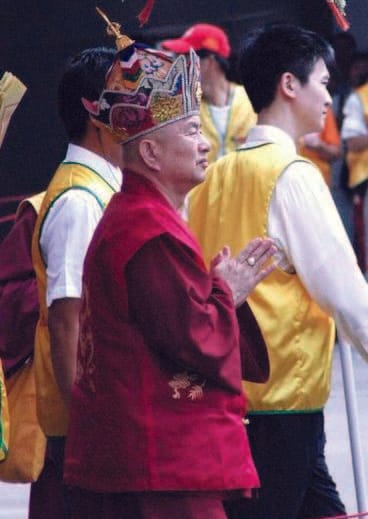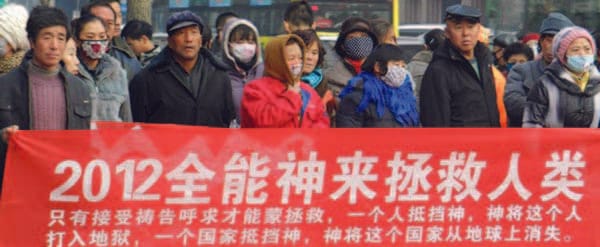“Do not listen, do not read, do not believe, do not disseminate” is a widely circulated anti-cult slogan. China’s central government began labeling and banning religious groups as “cults” (邪教) in 1995—four years before the proscription of Falun Gong.
In 2000, the Ministry of Public Security issued a notice describing 14 groups identified as cults by central authorities. A decade later, 22 “cults” had been identified, according to an article on the China Anti-Cult Association website. Among them were qigong-based Falun Gong, the largest and most vocal group; 18 Protestant sects; and three variants of Buddhism: True Buddha School, Guanyin Famen, and Yuandun Famen.

Buddhism has a long history in China and has been able to attract new adherents with healthy, and increasingly trendy, practices like vegetarianism and meditation. An estimated 185 million Chinese identify as Buddhists, according to the Chinese Spiritual Life Survey conducted in 2007. Their activities are overseen by the Buddhist Association of China (BAC) and the State Administration for Religious Affairs. Both bodies promote the love of religion and the state.
Article 36 of China’s constitution grants “freedom of religious belief” so long as “religious bodies and religious affairs are not subject to any foreign domination.” Unlike Christian groups persecuted prior to the reform and opening of the 1980s, Buddhist organizations were never targeted as part of an anti-imperial struggle, since most Buddhist groups were founded by mainland or overseas-born Chinese. Nevertheless, foreign infiltration and so-called anti-China remarks are cited as reasons for the proscription of Buddhist groups along with apocalypticism.
Those who engage in Buddhist worship without permission from BAC or local religious bureaus have been charged with disturbing social order, fraud, illegal business activity, or crimes under Article 300: “organizing or using a cult to undermine implementation of the law.” Punishment for these offenses results in confiscations, fines, detention, reeducation through labor, or imprisonment.
True Buddha School 灵仙真佛宗
True Buddha School (TBS) is a modern Vajrayana Buddhist sect founded in Seattle in 1979 by Taiwanese American Lu Sheng-yen (卢胜彦), known by his disciples as “Living Buddha.” The majority of TBS followers are in Taiwan and parts of Southeast Asia. The group claims to have 5 million followers, according to the Encyclopedia of Taiwan.

Introduced to mainland China in 1988, TBS emphasizes the need to diligently cultivate spiritual advancement and teaches disciples to transform difficulty into positivity through enlightenment. The Ministry of Public Security reported that the group disseminated a large amount of publications and propaganda and had branches in Shanghai, Guangzhou, and Kunming with followers across 13 provinces and municipalities.
TBS was banned in 1995 due in part to critical statements Lu made about the government’s decision to violently suppress student protesters in Tiananmen Square in 1989. Chinese authorities labeled Lu as “hostile to the socialist system,” saying he had given “multiple public speeches attacking the party and government,” organized ten thousand people in Hong Kong to join a memorial puja (worship service) for June 4 protesters, and “used newspapers and radio to broadcast the memorial all over the world.”
TBS activities have been driven underground in China, but are not necessarily dormant. Government records document instances of “legal education,” confiscation of religious materials, and the demolition of a temple between 1996 and 2005. As recently as 2011, a local government in Sichuan listed TBS alongside Falun Gong and Guanyin Famen as inspection targets.
Guanyin Famen 观音法门
Guanyin Famen (GYFM) was established in 1988 by Vietnamese-born Chinese Shi Qinghai (释清海), known to her followers as the Supreme Master Ching Hai. Introduced to mainland China around 1992, GYFM gained about 500,000 followers, including party members and senior cadres, across more than 20 provinces, according to the Information Centre for Human Rights and Democracy in Hong Kong. GYFM is likely the largest of the three Buddhist groups that are outlawed in China.
GYFM is registered with the Taiwanese Ministry of the Interior and is known internationally as the Supreme Master Ching Hai International Association, according to the Encyclopedia of Taiwan. The group is estimated to have more than 2 million disciples worldwide, with about 300,000 in Taiwan.

Core to the practice is daily meditation and a vegan lifestyle defined by “five no’s”—no killing, no lying, no stealing, no lewdness, and no drinking. According to the China Anti-Cult Association, GYFM believes that two thirds of the world’s population must become vegetarian to prevent the catastrophic effects of climate change. Running vegan chain restaurants and meditation centers around the world, its business activity is characterized by the Chinese government as foreign infiltration and swindling. GYFM was accused of visiting China frequently “under the cover of traveling, visiting, investing, and opening up factories for the purpose of recruiting and founding secret meeting places” and “intending to amass vast fortunes by opening vegetarian chain restaurants.” Shi has been described by the China Anti-Cult Association as anti-communist for remarks made in the early 1990s about communism’s inevitable demise in China, Vietnam, and the Eastern Bloc. But others affiliated with the group have reportedly been persecuted not for their political beliefs, but their business practices and association with foreigners.
Dui Hua’s Political Prisoner Database (PPDB) has information on over two dozen GYFM members, most of whom were detained between 1996 and 2005. Thirteen leading members were given prison sentences of one-and-a-half to eight years’ imprisonment under Article 300. A widely publicized case occurred in April 2001, when the Yanta District People’s Court in Xi’an sentenced Liu Shiyao (刘世尧), Zhang Huadong (张华东), Cheng Wei (程炜), Ma Yi (马懿), Ge Lin (葛麟), and Hua Sihong (华四红) to three to eight years’ imprisonment. They were accused of using propaganda and practice sessions to “cheat” disciples out of a total of 320,000 yuan. The individuals reportedly received instructions and religious texts from a foreign GYFM agent and distributed the texts to a number of higher education institutes. They also allegedly planned to join an international retreat in Thailand.
As religious groups gained popularity, Chinese leaders worried that spiritual protest might shift into mass revoltDui Hua
Although the number of publicized cases has decreased sharply in recent years, local government records continue to provide evidence of repression. On March 21, 2009, Urumqi police confiscated a total of 86,800 leaflets and detained four suspects. In 2011 authorities prevented a total of 242 members from exiting Jilin Province to attend a puja in Taiwan.
The most recent conviction reported in Chinese media was in 2012. In March, Jilin’s Tiedong District People’s Court sentenced two defendants to seven years’ imprisonment for organizing or using a cult to undermine implementation of the law. Both were accused of using donations of 10,000 yuan to purchase and distribute leaflets and 2,600 copies of a book on vegetarianism and climate change. Two additional defendants, a couple who organized a video screening at their home, were given suspended sentences.
Yuandun Famen 圆顿法门
Like the Christian sect Almighty God, homegrown Buddhist group Yuandun Famen (YDFM) claims to be able to rescue disciples from an impending apocalypse. The founder Xu Chengjiang (许成江) was originally a follower of GYFM. Combining doctrines from different Buddhist scriptures, he established YDFM in 1998. The group was banned a year later, and according to legal documents, Xu was detained seven times between 1998 and 2002 for illegal proselytizing. In December 2000, Xu named his son, Xu Longjing (许珑璟), as his successor and continued to organize large-scale pujas. In the early 2000s, YDFM had more than 10,000 members across 20 provinces, municipalities, and autonomous regions.

Shortly before YDFM was banned in December 1999, the Mudanjiang Public Security Bureau in Heilongjiang Province shut down three home gatherings organized for a total of 80 members. Detention center police officer Ma Jinglan (马景兰) and retired cadres Liu Chunyang (刘春阳) and Zhang Yan (张彦) were accused of spreading doomsday rumors. To shelter disciples from what she considered impending disaster, Ma raised funds to purchase five blocks of buildings, to rent additional venues for members, and to stockpile 20,000 kg of food and soybean oil. Other disciples who joined the gatherings claimed that they only did so in an effort to improve their health, and local police claimed that these individuals agreed to voluntarily destroy YDFM publications and terminate practice sessions after the group was banned.
In 2003, Xu Chengjiang and his son became the only members known to be imprisoned. The former was sentenced to life imprisonment on three charges: organizing or using a cult to undermine implementation of the law, fraud, and rape. Xu Longjing received a 13-year sentence for organizing a cult and fraud. Since information on YDFM is limited to government sources, it is unclear whether the charges were justified. The court verdict alleged that the Xus amassed a vast fortune from the sales of cassettes, books, and CDs and “swindled” a total of 5.9 million donations from disciples throughout China. The group’s influence declined rapidly after the trial, but there is evidence that run-ins with police continued. In Xinjiang, the Bortala Public Security Bureau confiscated a large amount of propaganda and audio materials in 2005, and six members were detained in a separate case in 2006.
Mobilizing Force
After the gradual lifting of religious suppression following the end of the Cultural Revolution in 1976, Chinese people turned to religion to fill the spiritual vacuum that came with the massive socio-economic transformations of reform and opening. Some religious scholars coined the term “new religious movements” to describe new sects that have emerged since the 1980s. As religion scholar Dr. Scott Lowe opined in his article “China and New Religious Movements,” Chinese leaders were initially tolerant to some of these groups as the focus on economic development precluded their ability to “keep track of everyone’s private business.” Nevertheless, as religious groups gained popularity and mobilizing potential, Chinese leaders were also aware that a spiritual protest might shift into mass revolt if religion remained outside state control.
While China’s anti-cult propaganda often labels “cults” as “anti-science, anti-humanity, and anti-society,” the harmful nature of its banned Buddhist “cults” is not universally recognized. As new Buddhist groups whose doctrines differ from dominant streams, TBS and GYFM have drawn some criticisms outside China. Several Taiwanese and Malaysian Buddhist groups have openly questioned Lu Sheng-yen’s Tibetan lineage and legitimacy as “Living Buddha.” In 2002, Lu was sued for sexually abusing a former TBS member, but the charges were dropped due to insufficient evidence. Some Buddhist groups and western news media criticized Shi Qinghai for her luxurious lifestyle and selling expensive artwork to her followers. But despite these controversies, China is the only nation to have banned these groups.
